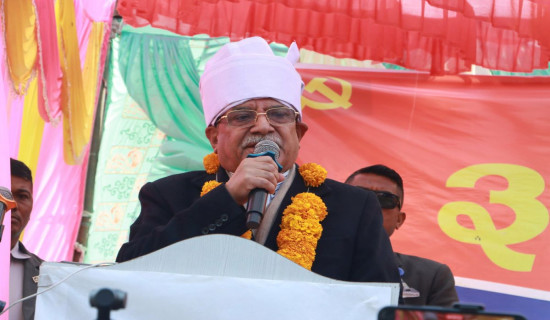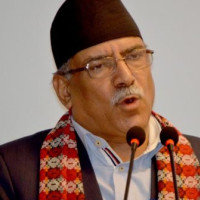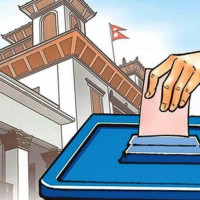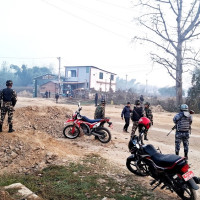- Saturday, 14 February 2026
Education As Youth Empowerment
Nepal has significant potential for growth and development, largely due to its large youth population. To harness this potential, it is essential to actively engage young people in the educational process. By involving the youth, we can foster a sense of ownership and empowerment, which will contribute to the nation’s overall progress. Without the power of education, young people, both in Nepal and elsewhere, become like a toothless snake—unable to contribute meaningfully to the development of their country and society.
Education is the key that empowers youth to think critically, act effectively, learn efficiently, earn sustainably, and teach others. It is, without a doubt, the most powerful tool for shaping and securing a bright future for young people. Unfortunately, many individuals at the college-going age show a lack of interest in education. This disregard not only negatively impacts their personal lives but also jeopardises the future of the entire nation.
The consequences of this trend are already being felt, as young people increasingly seek foreign menial jobs rather than contributing to their nation with a sense of pride and responsibility.
To address this issue, several ideas have been generated to attract young people to education and inspire them to recognise its true value. Creating student-centric learning environments is essential to capture the interest and enthusiasm of the youth. Implementing interactive teaching methods, group projects, and hands-on activities can make the learning process more engaging and relevant. By using diverse learning styles, educational institutions can cater to the varied interests and preferences of the youth. Practical classes, like taking them to agricultural fields, forests, factories, industries, markets, etc., can be helpful for them to observe what is happening in their surroundings, in their neighbourhood and in their country. They will feel what change is necessary in these processes and how they can contribute. They should enjoy learning to the core, not be forced to learn, and they should feel free to learn, not be bothered by trivial do’s and don’ts.
Extracurricular activities play an important role in enhancing the overall educational experience for students. Schools and colleges in Nepal should actively promote and diversify extracurricular offerings, including sports, arts, music, and clubs. Literary activities like poetry symposiums, quiz contests, debate competitions, oration (speech contests), and essay and story writing will encourage them to write and speak in public and to know about the world. These activities provide platforms for youth to explore their talents, develop leadership skills, and foster a sense of community. Moreover, these ideas can help them to earn prizes, a name, self-confidence and self-respect as well.
Involving students in decision-making processes at educational institutions inspires them to feel a sense of responsibility. Establishing student councils or committees that jointly work with school administrators allows the youth to raise their opinions on matters affecting and relating to their education and sanitation in the premises. SQC, students’ quality circle, is supposed to work for quality in a better way. This participatory approach fosters a culture of inclusiveness and shared ownership in them.
The youth in Nepal, like their global counterparts, are interested in technological innovations and know-how. The use of technology in education can make the learning process more appealing to them. Introducing e-learning platforms like e-libraries, interactive digital resources, the approach of digital pedagogy and online collaboration tools fascinates the youth and prepares them for the digital age. The COVID-19 lockdown period taught a valuable lesson: when necessary, we must be well-prepared to conduct online classes effectively. For this, both teachers and students need to be well-equipped with technological knowledge and tools.
Fostering an entrepreneurial mindset among the youth is important for their future success. Integrating entrepreneurship education into the curriculum encourages creativity, critical thinking, and problem-solving skills. Innovation hubs, startup competitions, and mentorship programmes can further ignite the entrepreneurial spirit among Nepali youth. More or less, the world is thriving with people who are equipped with entrepreneurial prudence and market strategies that help business activities grow and sustain themselves.
Connecting education to real-world issues through community engagement and service learning projects allows the youth to see the practical applications of their knowledge. It is because knowledge earned in the real society is more useful and practical than the knowledge earned in the college buildings.
Involving them in community service develops a sense of social responsibility and reinforces the idea that education can be a source for positive change. This idea brings them close to the rustic people in the society and helps them to grasp the real pains that people in most of the villages in Nepal are tolerating in the course of living.
In addition to academic knowledge, equipping the youth with practical skills is essential. If we introduce vocational training programmes, workshops, and skill development courses within the educational framework, it will create opportunities of employment for students. This approach connects education with the needs of the job market and provides practical, career-relevant skills. People with practical skills in different fields are easily sellable in the global market. In our school and university curriculum, we lack the courses and the textbooks that help students to learn skills.
We should establish mentorship programmes where experienced professionals or older students guide and support their younger counterparts because it is highly beneficial. Mentorship fosters a sense of cooperation, provides valuable insights into various fields, and helps cope with the challenges of academic and personal growth. This will inject in them a sense of responsibility as well.
Promoting cultural exchange programmes and providing opportunities for global exposure can broaden the horizons of youth. When they experience different cultures, perspectives, and educational systems, they can get inspired with a global mindset. It will encourage the youth to think beyond local boundaries, contributing to a more interconnected world.
Bringing young people to work with youth-led organisations and initiatives can bring fresh and innovative ideas to the education sector. Partnerships with NGOs, community-based organisations, youth-driven projects and even government agencies can create a dynamic ecosystem where the youth actively contribute to educational development.
Engaging the youth in education in Nepal is a dynamic and collaborative process that requires the concerted efforts of educational institutions, policymakers, communities, and the youth themselves. By fostering student-centred learning environments, promoting extracurricular activities, integrating technology, emphasising entrepreneurial education, encouraging community involvement, offering skills development programmes, establishing mentorship initiatives, providing global exposure, and forging partnerships with youth-led organisations, Nepal can unlock the full potential of its young population. In doing so, the nation not only invests in the individual growth of its youth but also lays the foundation for a more informed, innovative, and empowered society.
(The author is a professor at Baneshwor Multiple Campus.)
















